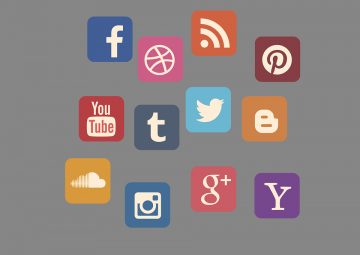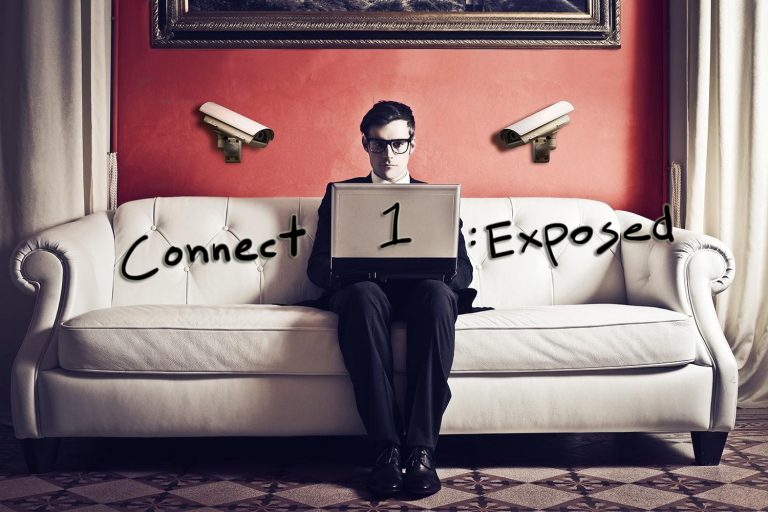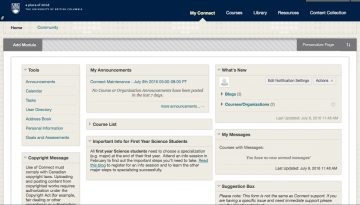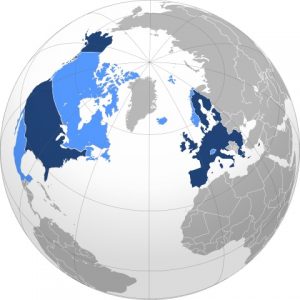The Digital Tattoo sits down with Emmy-award winning journalist, founder of the Global Reporting Centre, and UBC professor Peter Klein to discuss the media’s changing landscape. He covers topics like how stories are being told, for what reasons, by whom, and will be incorporating it all into his course, JRNL 100A: New Media and Society.
The Peter Klein Interview
The Internet’s Most Valuable Product
By bryan short on July 21, 2016 | Tagged with
 You’ve likely heard the old adage, “If you aren’t paying for the product, you are the product.” Although the quote’s originator is unknown, it has been around since before the Internet boom of the 1990s.
You’ve likely heard the old adage, “If you aren’t paying for the product, you are the product.” Although the quote’s originator is unknown, it has been around since before the Internet boom of the 1990s.
The phrase could have been said when cable television first began broadcasting over the airwaves. It could have been said during the first radio broadcast. Or when the printing press began rolling off free dailies. In any case, it isn’t a new concept.
But it seems particularly relevant today.
The potential is frightening
We’re openly sharing information and creating data at a rate never seen before. Most often, online services are not charging any fees. And so, once again, the old adage applies.
A new play called “Privacy,” has opened in New York city and stars Daniel Radcliffe. The audience is encouraged to keep their cellphones on during the performance, and are even asked to participate in the theatrics, which involves someone onstage researching information about audience members and displaying it on a large screen. The New Yorker, in their review of the play, writes that:
“We’re told—rather, shown—how intrusively specific our ‘metadata’ is, from targeted advertising to an iPhone feature called ‘Frequent Locations.’ (Settings -> Privacy -> Location Services -> System Services -> Frequent Locations. Whoa, right?)”
Two equally invasive applications have recently received funding that transform Internet users’ personal data into rated profiles. These applications compile information from sources as varied as social media profiles, browsing history, and GPS coordinates. The profiles are then sold to potential employers, landlords, banks, and even prospective dates.
This means that your online behaviour could be evaluated and taken into account the next time you apply for a job, view an apartment, ask for a loan, or even ask someone out for a drink.
How it might look
The profiles are a compilation of data that establishes the potential risk of an individual. Are you up all night on Instagram? You’ll likely be tired the next day and won’t make a good 9-5 employee. Do you often tweet about financial hardship? You’re probably not the ideal candidate for that car loan. Do you post a lot of dating pictures on Facebook? Maybe that special someone is a bit more selective.
Unsurprisingly, The Washington Post took a much more critical look at the potential of these startups than the coverage provided by American Banker, which chose to focus on their more positive applications and monetary benefits.
You can judge for yourself: Socure claims to provide “identity verification using online and social data,” and Score Assured is supposedly “unlocking big data to bring you insightful referencing.”
Shame over credit scores
In China, people can receive considerable discounts on otherwise very high-interest loans if they willingly give up personal information like social media profiles, browsing history, and GPS coordinates. The lenders use this information to establish credibility and a means of recourse should the borrower default.
Chinese university students are even said to be submitting nude photos as a form of collateral for high-interest loans. If the students are unable to keep up with payments on the loans, the photos are then sent to family members.
Big Tech investing in healthcare
Apple, Google, IBM, Facebook, and even Uber, are all investing in digital healthcare. For Google, this means analyzing and organizing search terms and results to lead a user towards a more accurate diagnosis of a medical issue. But in terms of personal information, this means that Google might know more about your health than your doctor.
With a surge in innovation around wearable technology capable of monitoring everything from heart rate to blood-sugar, private corporations are amassing huge amounts of information, far beyond what public researchers have ever had access to. The implication is that the field of healthcare could be revolutionized if this data were to be made publicly accessible to accredited researchers. But the reality is that this information could also be contained and exploited for profit.
What do you think?
How do you feel about your personal information being used to diagnose medical issues and being sold to the highest bidder, be it your future landlord, employer, or partner? Would it change the way you use the internet? How much of yourself already exists online that you might want to get rid of in light of these new applications? Let us know in the comments.
UBC Streeters: Pokémon Go
By bryan short on July 17, 2016 | Tagged with
We haven’t been able to avoid the hysteria surrounding Pokémon Go. Just outside the doors of Irving K. Barber library, crowds of students with their faces glued to their phones have been gathering around the fountain and under the clock tower. They’re all searching for Pokémon, and apparently the area is swarming with them.
We talked with some of the students in the crowd about why the area is so popular, how the game works, and if they have any privacy concerns with it. Check out their responses in the video below, and read on to find out more about phenomenon that is Pokémon Go.
The Virtual Phenomenon
Only one week into its launch, and not yet available in Canada, Pokémon Go is officially the most popular mobile game in history. As of Monday, it had 21 million daily active users, had increased Nintendo’s stock by 7.5 billion dollars, and became more popular on the internet than pornography.
But you don’t need statistics to understand the importance of this phenomenon. Wandering herds of people can be seen all around UBC’s Vancouver campus with their eyes glued to their phones in search of Pokémon. One very popular location is the area around the fountain near the clock tower and just outside of Irving K. Barber. Apparently, players are dropping electronic lures that attract a greater number of Pokémon to the area.
The game overlays virtual items and places—like Pokémon, Poké Gyms, and Poké Stops—on real world locations. This blurring of the real and virtual is called augmented reality. Poké Gyms are places where players can battle other teams and win possession of the area, and are often located at churches. There are also Poké Stops, in-game virtual stores where players can purchase Poké Balls and other items in exchange for Poké Coins, which players can earn or purchase with real money.
This kind of virtual customization of real world locations is one of the ways the app is monetizing its popularity. Businesses can set lures and attract players to their stores. For $100 you can purchase 14,500 Poké Coins, and an eight-pack of lures costs 680 Poké Coins, meaning for about $1.19/hour you can have a bunch of people staring at their phones and loitering around your business. Likewise, professors would be wise to drop a few lures in classrooms to increase attendance during the summer months.
The game is currently grossing 1.6 million dollars a day from iOS installations alone. People are spending more time on the app than Facebook, and it’s been downloaded more than Tinder and Twitter.
The Reality of its Success
I went out and spoke with several people playing the game around the fountain. A student reported that he had been there at two that morning and that the crowd had been about the same size of about fifty people. Another person shared a story about how her roommate had called a house meeting to intervene when she considered joining a rival Pokémon team. They resolved their differences and later fought a losing battle against a car full of eight-year-olds, in the rain, at midnight. This scenario should help to clarify the hysteria surrounding Pokémon Go.
The good thing is that people are getting outside and being active and social as the game encourages exploration and interaction. But augmented reality blurs the distinction between online and offline in ways that can also be negative. A teenager in Wyoming discovered a body while searching for Pokémon near a river, and thieves are reportedly taking advantage of the game by luring players into dangerous locations.
The game also makes an overwhelming amount of requests for permissions to access various services on your phone. Niantic, the company that developed the app in partnership with Nintendo and a Google spinoff, has scaled back its permissions since the launch, but still has access to a lot of information that could compromise users’ privacy. Because the game operates with Google Maps and has access to the GPS coordinates of players as they navigate the world, information about where people go and how long they spend there, could be sold to advertisers or worse.
The terms of service also contain a forced arbitration clause that removes users’ rights to file a lawsuit against Niantic, and also prohibits the user from joining any sort of class action lawsuit against the company. This means that if Niantic sold or breached user data, or violated privacy laws in any other way, the only means of arbitration a user could pursue would be through private mediation, which would be both expensive and time consuming, and whatever resolution was resolved, wouldn’t be applicable to other users. You can opt-out from this clause in the terms of service by emailing termsofservice@nianticlabs.com with “Arbitration Opt-out Notice” in the subject line and clearly declaring that you’re opting out of the arbitration clause of Pokémon Go’s terms of service in the body of the email.
Blackboard Connect: Exposed (Part 1)
By bryan short on July 8, 2016 | Tagged with Connect, Connect series, Digital literacy, learning analytics

Have you ever wondered how much and what kind of information is being collected when you use Connect? Maybe you’ve taken an online course and wondered how your participation grade was calculated? Your instructor might claim that it’s based on posts in the discussion forum, but the metrics probably go far deeper than that. It’s not as simple as a human reading and counting your posts; it’s computer algorithms that analyze, record, and make inferences about, the quality of your work.
If you’re curious to discover what personal information is being recorded by UBC’s  Learning Management System (LMS), Blackboard Connect, then you might be interested to learn that you have the power to request information from UBC’s records. Under BC’s Freedom of Information and Protection of Privacy Act (FIPPA), you have the right to access any data that concerns your personal information.
Learning Management System (LMS), Blackboard Connect, then you might be interested to learn that you have the power to request information from UBC’s records. Under BC’s Freedom of Information and Protection of Privacy Act (FIPPA), you have the right to access any data that concerns your personal information.
I took an online course last summer that used Connect and calculated my grade based on assignment submissions, readings, and discussion forum posts. I’ve filed a ‘Request for the Disclosure of Personal Information’ with UBC’s Freedom of Information Specialist. I want to know exactly how learning analytics affected the calculation of my grade within Connect, and I’m curious to learn how my grades were calculated and how much information is being retained.
FIPPA requires that UBC and all public bodies retain records of “personal information [used] to make decisions that directly affect people” (like receiving a grade for a university course) for at least one year. I made my request by using a modified version of UBC’s Authorization for Disclosure to Self form, and requested the following personal information:
“All records and other personal information collected through the University of British Columbia’s Learning Management System (LMS) Blackboard Connect, for courses including but not limited to GRSJ 300 section 98A, and covering information that includes but is not limited to evaluations, comments, grades, network interaction analysis, discourse analysis, content analysis, social learning analytics, disposition analytics, or any other metrics related to the field of learning analytics and used by the LMS to evaluate my interactions within Connect.”
Yesterday, I delivered the form by hand to the Office of Counsel in the Old Administration building on UBC’s Vancouver campus. The letter was immediately opened and reviewed by staff and a photocopy of my government ID was taken. I was told that an official case number will be issued and sent to me in the next several days. Officially, UBC has 30 days to comply with my request. Stay tuned for another blog post when I receive a response.
What kind of information do you think will be revealed? Will UBC comply with my request or refuse to grant me access to my personal information?
The Blog Series
The Connect Exposed blog series documents my inquest into data collection on Blackboard Connect, the difficult process of obtaining my data from UBC, and privacy concerns around the collection of student information.
Blackboard Connect: Exposed (Part 1)
Blackboard Connect: Exposed (Part 2)
Blackboard Connect: Exposed (Part 3)
Blackboard Connect: Exposed (Part 4)
Blackboard Connect: Exposed (Part 5)
Blackboard Connect: Exposed (Blog 6)
Blackboard Connect: Exposed (Blog 7)
Encryption
By katie wilson on July 6, 2016 | Tagged with digital citizen, Digital identity, Digital literacy, encryption, end-to-end encryption, Online Safety, privacy
Do you use messaging apps like WhatsApp only to notice a new admin message appear in a chat? “Messages you sent to this chat and calls are secured with end-to-end encryption.” While many who use universal messaging apps to keep in touch with family and friends over different devices might be quick to dismiss this message, the end-to-end encryption of messages is actually pretty important.
Encryption is the process of encoding information in a way that only authorized parties, (those possessing a key for decryption) can access it. The encryption of a message does not necessarily prevent someone else from getting the message, but rather makes sure the only person that can read it, is the person that message is intended for. In today’s world, where privacy online is becoming a more and more of an issue, it’s important to understand how encryption works and why it is important.
Take iMessage for example. Techcrunch does a much better job at explaining end-to-end encryption but essentially when you send a message from your device, even though it is travelling through Apple’s public server, it is encrypted into something that only the other party’s device knows how to decrypt make readable.
But encryption goes beyond the world of data-based messaging apps to impact privacy online in many more contexts.
Recently, Mozilla has launched an advocacy program designed to raise awareness about encryption and why controlling personal information is so key. They also have developed projects like Let’s Encrypt, a free and open access Web certificate authority dedicated to making running an encrypted website easy for anyone.
It’s important to be aware of encryption in order to protect our personal information and keep ourselves secure online. Mozilla has also published 7 Encryption and Privacy Tips to raise awareness and instruct the public about the importance of encryption. As the battle over online surveillance wages on, it has become more important than ever to have people informed about encryption ready to stand up and fight to protect their privacy online.
Are all of the messages you send on a daily basis safely encrypted?
Follow Up: Peter Klein on the Influence of Facebook
By bryan short on July 4, 2016 | Tagged with
As a follow-up to the UBC Streeters video about online news sources, we spoke with UBC Professor Peter Klein for his take on using Facebook as a news source. He is an Emmy Award-winning journalist, writer, and documentary film maker, whose work has appeared on 60 Minutes, The New York Times, and in The Globe and Mail. This segment is a preview from a larger interview.
If you’re like many of the students in our Streeters video about online news sources, then you might also be getting your news primarily from Facebook. After hearing Professor Klein’s comparison of Facebook to traditional newspapers, will you act differently?
UBC Streeters: Online News Sources
By bryan short on June 26, 2016 | Tagged with
In this edition of UBC Streeters, we have conversations with students and find out where they’re getting their news from. As a follow-up, we posted a preview video of our interview with UBC School of Journalism Professor Peter Klein. He spoke about the impact of Facebook as a news source when compared to traditional newspapers. Where are you getting your news from? Are you aware of Facebook’s influence when you use it as an exclusive source for news?
If you’re interested in learning more about Facebook’s growing power as a news source, check out our blog post. You might also want to check out our feature on social media and take the online quiz.
Different Realms of Privacy: Europe and North America
By bryan short on June 10, 2016 | Tagged with
Worlds Apart

Europeans approach personal privacy differently than North Americans. In Europe, there are two laws that protect individual citizens over collective society: the right to be forgotten and the right to disconnect.
To understand these laws, and how they uniquely impact the digital identities of Europeans, it is necessary to examine the disparate legal frameworks of Europe and North America. Some laws that exist in Europe, cannot exist in North America because they infringe upon the freedom of expression that is enshrined in the Canadian and American constitutions.
“Europeans think of the right to privacy as a fundamental human right, in the way that we think of freedom of expression or the right to counsel.” Jennifer Granick, the Director of Civil Liberties at the Stanford Center for Internet and Society
When it comes to digital identity and online privacy, the ideological differences between North Americans and Europeans are rooted in the law. Where Europe promotes the privacy of the individual as a “fundamental human right,” North America favours the collective benefits provided by freedom of speech.
The Right to be Forgotten
Put into practice in 2006, this law allows Europeans to request personal information be removed from the internet and no longer be accessible by search engines. Examples of people who have requested to have information deleted include: a man who had been misidentified in an incriminating video; a doctor who had received negative reviews; and an actor who had an affair with an underage girl.
 As of May 2016, Google has delisted by request over 600,000 items across Europe. But Google has rejected a French court order to apply the right to be forgotten beyond Europe, and is currently engaged in a legal battle in France’s highest court. If you’re a citizen of the European Union, you have the right to request that information about you be removed from the internet permanently. Whether or not the process works, is another question.
As of May 2016, Google has delisted by request over 600,000 items across Europe. But Google has rejected a French court order to apply the right to be forgotten beyond Europe, and is currently engaged in a legal battle in France’s highest court. If you’re a citizen of the European Union, you have the right to request that information about you be removed from the internet permanently. Whether or not the process works, is another question.
Within North America, there have been many battles to remove potentially damaging information from the internet that have been blocked by the freedom of expression. One recourse that individuals have, and legal experts use, is copyright. In North America, one of the only ways to have images or videos removed from the internet is to make a copyright claim against them. Google handles around 23 million of these claims each month.
The Right to Disconnect
Part of a Bill that just passed in the French lower parliamentary house, the right to disconnect mandates companies of over fifty employees to adopt a charter that indicates the hours during evenings and weekends when employees cannot be contacted.
“The development of information and communication technologies, if badly managed or regulated, can have an impact on the health of workers. Among them, the burden of work and the informational overburden, the blurring of the borders between private life and professional life, are risks associated with the usage of digital technology.” States Article 25 of the Bill
Although this is only a small measure within a largely unpopular bill, it will further ensure personal privacy for French citizens. Communications between employers and employees within North America are protected under freedom of expression, no matter when they take place or how frequently.
What do you think?
Although freedom of expression is in conflict with these two European laws, it has accomplished some very important things for North Americans. Would you rather have your individual rights protected through measures like the right to be forgotten and the right to disconnect? Or do you prefer the collective benefits of freedom of speech?
The Real Facebook Controversy
By Bryan Short on June 5, 2016 | Tagged with
Logging into Facebook and checking the newsfeed is something that most people do everyday without really considering its implications. According to recent statistics, people of all ages are doing this more often and for more reasons than ever before.
Facebook is now the world’s largest and most powerful media organization. People are using it to find out about more than just their friends; they’re using it to discover what’s happening in the world. And for many people, it has become their primary news source.
Although Facebook is expected to provide the news, it doesn’t operate like a traditional news organization. The newsfeed module is curated by computer algorithms that don’t maintain the same standards of objective reporting that conventional media strives for.
“The idea that algorithms are neutral, unbiased, objective, mathematical … is the most dangerous idea facing the 21st century public sphere” – Zeynep Tufecki, informational and library science professor.
Facebook doesn’t produce the news that exists on its platform, but they do select which versions its users see. Computer algorithms choose the content that appears in the newsfeed module based on a user’s activity. Recently, the ‘Trending Topics’ module became a subject of controversy because leaked documents revealed the role of human intervention in its assembly.
This is a serious issue not only because of Facebook’s growing power as a media juggernaut, but because the public is becoming more vulnerable to manipulation. By limiting exposure to varied opinions, the public becomes less informed and the conditions for bias are created. Some solutions have been proposed that address this looming threat, but nothing has been done to sufficiently address it.
A U.S. Senator has demanded that Facebook answer for its alleged political bias and Mark Zuckerberg has responded. But Facebook aside, a major concern is being overlooked; if the public begins to rely upon any single source to compile all of its information, then one of the most effective tools of a functioning democracy—a well-informed public—is being dismantled.
Where do you get your news from? Do you believe that Facebook can influence the public’s political beliefs? What’s better or worse: computer algorithms or human intervention?
Update: We recently interviewed UBC students about their online news sources. While every student we spoke with uses some form of social media to stay informed, we found that nearly all are relying on Facebook. They’re mostly going to Facebook for news because it’s easier and more personalized than traditional media sources like newspapers and television.
We asked students if they were aware of the influence of getting the news from social media outlets like Facebook. Most were aware of its disadvantages, but also accepting of these limitations. Students are not using social media to get the news out of ignorance of its restrictions; they’re using social media to get the news because traditional media has failed to adapt to their lifestyles and technology.
What does the future hold for news media? Students we spoke with didn’t state that they had any preference for one particular form of social media, be it Facebook or otherwise, and most often checked several at once. They favoured services like Reddit and Facebook because they aggregated news from different sources and were somewhat customizable. Perhaps, if traditional news media were adapt these features, students would be more likely to use their services.
Another update: We spoke with associate professor and Emmy award-winning journalist, Peter Klein, about the influence of Facebook. Check out his professional opinion on how Facebook affects our understanding of the world.
UBC Streeters: Mindfulness and Social Media
By bryan short on June 2, 2016 | Tagged with
In this edition of UBC Streeters, we interview students on UBC’s Vancouver campus about social media. They talk about what kinds of networks they’re connecting with and why, how much thought they’re giving their communications, and if they’ve got any regrets.
How much time do you spend thinking before pressing send? You can assess your own social media use in the Think section of our social media page.
Check out this Digital Tattoo blog post to learn more about how mindfulness can improve your online communication.

